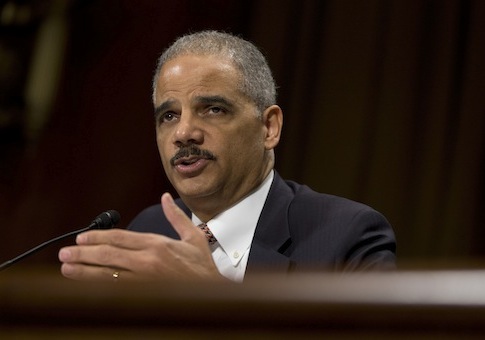Department of Justice officials were grilled over wasteful spending at the agency, including over $50 million on conferences, $11 million on luxury private jets, and a special unit that helps Hollywood produce films and TV shows, during a House Judiciary Committee hearing Wednesday.
The Obama administration has said thousands of criminals may be let off the hook because of U.S. attorney staff reductions due to sequestration. But Judiciary Committee Republicans say the agency can cut its lavish spending in other areas.
"Our review of DOJ spending show that tax dollars are also used at the department to pay for event planners at elaborate conferences, pizza parties and $12 cups of coffee, and to provide cars for Washington bureaucrats to simply commute between their homes and the office," said committee chairman Bob Goodlatte (R., Va.). "This is not money wisely spent."
Republicans noted that the FBI has a special $1.5 million-per-year unit that helps Hollywood make movies and TV shows, including "Fast and the Furious" and "CSI." The unit advises filmmakers on costume and scenery design, provides FBI facilities for filming, and boasts on its website that it has "assisted the motion pictures ‘The Kingdom,’ ‘Shooter,’ and ‘Breach’; television programs like ‘Without A Trace,’ ‘CSI,’ ‘Numb3rs,’ ‘Criminal Minds,’ and ‘The Closer.’"
The revelations come after Attorney General Eric Holder warned $100 million in budget cuts to the U.S. Attorney Office could result in thousands of criminals being let free.
"Using data on average number of cases handled per attorney in FY 2012, the [U.S. attorneys] would handle 2,600 fewer cases in FY 2013 than in FY 2012 comprised of an estimated 1,600 fewer civil cases and 1,000 fewer criminal cases," Holder wrote in a letter to the U.S. Senate Appropriations Committee in February. "Criminals that should be held accountable for their actions will not be held accountable, and violators of our civil laws may go unpunished."
According to the DOJ, sequestration would bring it back to 2009 funding levels. Rep. Trey Gowdy (R., S.C.) asked whether the agency let criminals go in 2009 because it did not have the financial capacity to prosecute them.
"I am not aware of criminals being let go," said Michael E. Horowitz, the DOJ’s inspector general. "I wasn't in the Justice Department at the time."
Assistant Attorney General for Administration Lee Lofthus said he was unable to answer the question.
Gowdy also asked whether special assisted U.S. attorneys—lawyers who work pro bono for the DOJ in order to gain the experience—would be able to take on cases if the DOJ lost staff due to budget cuts.
"You can have a special [U.S. attorney]," agreed Lofthus.
The DOJ spent $54 million on conferences last year, which it said was a reduction from the $73 million and $93 million it spent on conferences in 2009 and 2010, respectively. But Republicans said the DOJ could cut costs by spending less on food and drinks, including $5.50 canned sodas and $12 coffees.
Citizens Against Government Waste president Tom Schatz, who also testified at the hearing, agreed.
"It’s the kind of reasonable use of resources that should be embedded in the management of agencies, not something that only comes up when there’s a scandal or too much spending is exposed," Schatz told the Washington Free Beacon in an interview after the hearing.
